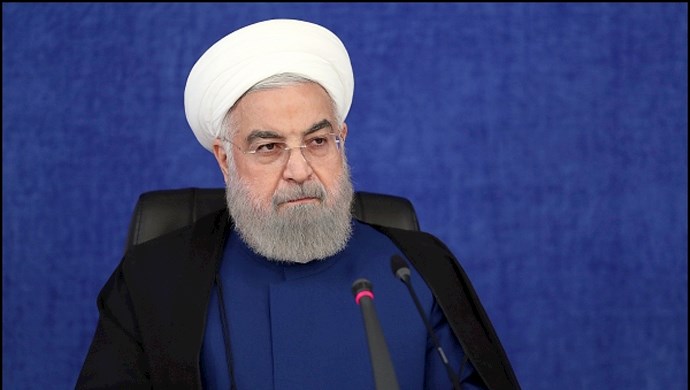Analysis by PMOI/MEK
Iran, June 24, 2021—In his daily cabinet meeting on Wednesday, outgoing regime president Hassan Rouhani admitted that the Iranian people largely ignored and boycotted the regime’s presidential election, held on June 18.
It’s no secret that the regime’s elections are an engineered masquerade with carefully selected candidates that are fully loyal to the rule of the mullahs the regime’s supreme leader. But the regime needs to put up the election farce for the sake of creating a façade of democracy and using it as a cover to continue the suppression of dissidents and protesters inside Iran and to promote the appeasement policy in its relations with other states.
Therefore, Rouhani, who occupied several key security positions before becoming the regime’s president in 2013, fully understands the importance of the elections from a security perspective and for keeping the regime in power. He was among senior regime officials who urged the people to vote on the eve of the election.
And yet, he did not mince words in confirming that the people widely boycotted the regime’s elections. In his cabinet meeting, Rouhani expressed concern at the low voter turnout and the effect it can have on the regime. Rouhani further said that what makes the situation more concerning is that the extremely low turnout happened despite requests by regime supreme leader Ali Khamenei for the people to vote.
Of course, it was clear for the regime that the people would not vote in the elections. But what has made the situation worse is the low morale within the regime’s own ranks. According to various reports, even the regime’s loyalist base, which are less than 4 percent of the population, were not motivated to vote. An open letter written by a regime loyalist to the regime’s new president Ebrahim Raisi and published in several state-run outlets states: “We have so many concerns that we don’t even have the strength to vote and we were left behind.”
But how many of the regime’s loyalists were “left out” from voting. Calculating this number is difficult, but a significant indication is the number of invalid ballots that were cast during the election. According to the regime’s own official stats, there were at least 4 million invalid ballots.
In his remarks, Rouhani implicitly blamed the low voter turnout on the Guardian Council, the body that oversees the elections and vets candidates for their loyalty to the regime and qualification to run for official posts. Rouhani said that the way the candidates were arranged resulted in the low voter turnout, by which he meant that if there were more candidates from the so-called “reformist” faction, there would be a greater chance for a high voter turnout.
But while Rouhani was busy trying to score points against his rival, what he failed to acknowledge was that the people of Iran are past the point of choosing between regime factions and rivaling officials. For several years, the Iranian people have been chanting "Reformists, hardliners, the game is over," expressing their hatred toward all factions within the regime.
Prior to the election and during the voting day, people across Iran explicitly made it clear that they do not believe that their problems will be solved by choosing a thief and murderer among the many that are running the regime.
From farmers to teachers, students, workers, and pensioners, different communities that held protest rallies during the runup to the elections had one slogan in common, “We will not vote.” And this was before the regime even declared the qualified candidates for the election.
In the final weeks before the election, families of protesters and dissidents killed and executed by the regime posted videos on social media in which they explicitly said, “My vote is regime change.”
Meanwhile, during open-mic sessions the regime held in different cities to promote the elections and encourage the people to vote, different people courageously took the microphone and expressed their disdain with the regime and all its presidential candidates. “Why should I vote?” a man said. “So a thief among thieves goes and sits up there? To vote for a bunch of people who vet and qualify and disqualify each other? Should I vote for this formalistic appointment? And they’re lying that the enemy is the United States. Our enemy is right here! It wasn’t the U.S. that raised the price of poultry and potatoes and onion…”
And a young woman who spoke at another such session said, “Other states take our oil and build their countries. But our officials steal our money and it’s not clear what they’re building in this country. What did they do with the thousands, the billions of dollars? Did we ever find out what they built with it? We have all these mines and water resources that they’re selling, which part of the country are they building? Why is our country a wreck? They will remain like this forever. This is their nature. As long as they’re here, Iran will become worse than it is now.”
These are just examples that show the population’s total hatred for the ruling mullahs. So, Rouhani is right to be worried about the future of the regime in light of the national election boycott. Where he errs, however, is to claim that it could have turned out otherwise had there been other candidates.





